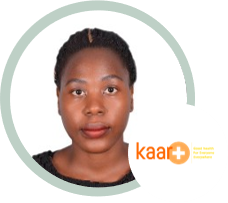Providing financial solutions to unlock primary rural health access

Angella Kyomugisha is one of the winners of the Women Empowerment Award. The Ugandan finance specialist is the co-founder and Chief Financial Officer of Kaaro Health. Angella and her team ensure access to health for rural people by providing finance for medical equipment and health and IT infrastructure to health clinics. This is highly needed, because while more than 80% of the Ugandan population resides outside urban areas, nearly 75% of all private health facilities are located in a few towns and cities, serving less than 10% of the patient population. Angella: “It is not acceptable that people in rural areas in Uganda are deprived of nearby quality primary health care.”
Women Empowerment Award Winner
Angella Kyomugisha
Kaaro Health
Interview
Tell me more about the medical healthcare situation in Uganda
“In Uganda, when a nurse graduates, she either gets absorbed in a private or public health facility in a city or big town. But not all nurses are able to find a job after they graduate. Also, many of these nurses can’t afford to start their own clinic. Kaaro Health targets these women and supports them to become health entrepreneurs in a remote village, which is often the village where they are from originally. Kaaro Health works in remote areas where there is no primary healthcare. We lease the necessary equipment, such as ultrasound machines, computers, examination tables, solar equipment, BP machines, centrifuges, microscopes, to the nurses, so that they can start their own clinic. Kaaro Health has also developed a clinic solution based on repurposed shipping containers that provide the space for experienced doctors to conduct remote consultations, using telemedicine. The business has largely focused on solar-powered equipment to overcome the challenge of unreliable energy access in rural communities.”
“Thanks to our service provision, women do no longer need to walk to the nearest district hospital, which is often far away. Instead, they can get the basic healthcare they need in their own village. For the nurse, it means that she can receive more patients, which allows her to pay back the loan for her equipment and clinic which she later owns.”
You are one of the co-founders. Tell me how you came up with the idea to start Kaaro Health
“My background is in finance. I used to work for a bank. And even as a student I was involved in finance, because at university we started a savings group, which was a really good experience. When I worked for a bank, I had to go to the field sometimes. Using my experiences as a student, I helped the female farmers in one of the villages to set up a savings group. This helped them to save little by little and use the money to improve their livelihoods. It felt so good to do something useful with my skills. At some point, I got sick in a village and that’s where it struck me that I couldn’t get access to an experienced doctor. It was such a lonely feeling. The next day, my colleagues rushed me to the nearest hospital, which was still six hours away by motor cycle. This experience made me realize what happens to the people who do not have a support system, nor the financial means to get the medical attention they need on time.”
“I decided to put my finance skills to use to help solve this issue. The current co-founders and I started to visit local health clinics. I remember in one of the first clinics we visited, there was no electricity and other major medical equipments. The nurse who worked there had to use a torch to ensure she could do consultations at night. We decided to provide her with solar equipment. That was the first step towards Kaaro Health as we know it today. We are currently serving 74 health facilities in the western part of Uganda. And our ambitions are to expand to the whole country and even beyond.”
How has Covid-19 affected your business?
“Covid-19 has been highly disruptive to Kaaro Health’s operations. A combination of reduced incomes within communities affected by lay-offs and lockdown restrictions, and concerns over contracting the virus, have reduced daily visits and appointments dramatically. Despite these concerns, the pandemic has also provided opportunities for the business, as more people (both patients and health care providers) have become comfortable with telemedicine and have sought it out.”
What does it mean for you to win the Women Empowerment Award?
“I was honored and proud when I heard that we won the price. The award has really given me the responsibility to utilize my skills and resources to support other women in Uganda. That’s our vision; we want to empower women with much needed healthcare, because you can’t be productive if you’re sick. At the same time, we give nurses the tools and skills to become health entrepreneurs. And more importantly, we give her ownership of the equipment, when she has reimbursed her loan, usually after five years. And as an organization we can do so much more. For example, we can use our network of health clinics to start sensitizing young women on avoiding teen pregnancies.”
Could you share a valuable lesson that you learned with us?
“I have learned from experience that without a support system around you, it’s difficult to make it in life. So make sure you surround yourself with people who can hold you accountable for the goals that you have set for yourself. Find yourself a mentor, who can challenge you. And when it comes to your health, be in charge of it. Take care of your body and mind.”
About the Women Empowerment Award
With the Women Empowerment Award, Bayer Foundation wants to empower women as key change makers and help female entrepreneurs generate social impact in Sub-Saharan Africa. Through this Award, Bayer Foundation offers a partnership which goes far beyond a one-off cash prize. The award includes 25,000 EUR in cash plus an in-kind contribution that equals 25,000 EUR in the form of a 24-week growth accelerator.
During this period, the winners will receive tailored support and training for scaling, including active investor feedback. In addition, they will be able to will tap into an extensive network of Bayer experts, who will offer coaching both in health and nutrition as well as sustainable agriculture related focus areas. Last but not least, all winners will become part of Bayer Foundation’s exceptional global alumni and partner network, which offers the opportunity to raise capital and exchange knowledge about experience gained.
By supporting female entrepreneurs with groundbreaking ideas, Bayer Foundation specifically recognizes and celebrates their role as game changers driving sustainability and social impact through entrepreneurial innovation.



